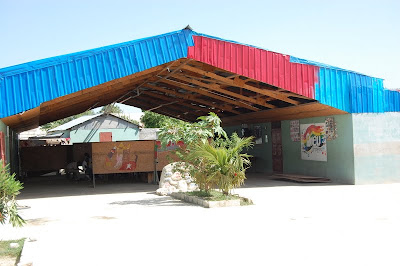A place of beauty, pain, redemption, and faith.
It is surrounded by tall, concrete walls topped with razor wire, and the entrance is a black, metal gate.
The kids here are safe and off the streets.
5 nannies wash laundry for 51 children in this
"laundry room".
"laundry room".
All clothes are shared.
Divided into boys' and girls' rooms,
the children sleep on bunks.
Potable water is kept in giant barrels.
Two metal cups are shared for drinks throughout the day.
Two metal cups are shared for drinks throughout the day.
Showers are taken behind a tarp,
and toilet time is a community experience.
Meals (usually rice and beans) are cooked in their
"Haitian kitchen".
"Haitian kitchen".
The nannies prepare powdered milk in a large ten gallon bucket,
and then serve it in metal cups.
and then serve it in metal cups.
We shed tears as we walked through the orphanage grounds, picturing the comfort of our lives back at home:
the individual bedrooms with plush bedding and bright colors, the playrooms, the loaded kitchens and laundry rooms, and the over stuffed pantries and refrigerators. We have toys that go unplayed with and food that goes uneaten.
Our hearts hurt for the kids.
Our hearts hurt for the way we have
lived in such abundance back at home.
Despite the sparse conditions,
this orphanage is a place where children share, sing, make pottery, lead their own church services, and learn about the Lord.
They learn the trade of bread making in the orphanage bakery.
Bread is sold from a window in the "Bread of Life Bakery" and from a truck that drives through the city.
The orphanage has endured an earthquake, two floods, a hurricane and regular unrest that frequently flares up in the streets of Port au Prince. The children have stories of trauma, abuse and neglect.
Still, this is a place of life.
We'll never forget this place, and
we'll never live the same again.
we'll never live the same again.












No comments:
Post a Comment